The Ukrainian military’s General Staff said Tuesday that Russian forces are focusing their efforts on taking full control over the Donetsk and Luhansk regions in the east.
Russian forces have begun a new offensive in the east of Ukraine after their retreat from the capital region and other parts of the country.
The Ukrainian military’s General Staff noted that "a new phase of war" began when troops attempted to break through defences in the eastern regions.
Read more about Tuesday's events as they unfolded in our blog below.

 ${title}
${title}
Live ended
Tuesday's key points:
- The Russian offensive on eastern Ukraine has begun on Monday night, Ukrainian President Volodymyr Zelenskyy announced in a video address.
- The Ukrainian military's General Staff noted that a “new phase of war” began when “the occupiers made an attempt to break through our defences along nearly the entire frontline in the Donetsk, Luhansk and Kharkiv regions.”
- Ukraine has received an undisclosed number of fighter jets and spare parts, US officials said on Tuesday night.
- The Kremlin has continued to expel European diplomats on Tuesday, including representatives of Austria, Belgium and the Netherlands.
- Russian troops have continued their shelling of Kharkiv, killing at least three and injuring 21 on Tuesday, according to the local authorities.
- Multiple missiles struck the western Ukrainian city of Lviv on Monday, killing seven and wounding 11, the city's governor said.
- Russia has Mariupol surrounded and has been fighting a bloody battle to seize it.
- Mariupol has been effectively wiped off the map, says Ukraine's Foreign Minister Dmytro Kuleba.
This is the end of our live blog for today. Euronews is signing off.
Pentagon spokesman: Ukraine has received undisclosed number of fighter jets
Ukraine has received fighter jets and spare parts to bolster its air force, Pentagon spokesman John Kirby said Tuesday, declining to specify the aircrafts' number, type, or origin.
"They have more fighter jets today than they did a fortnight ago," the spokesman told a news briefing, stressing that the US had facilitated the shipment of spare parts to Ukrainian territory but had not flown any aircraft there.
Communications with Chornobyl power plant restored, IAEA says
The International Atomic Energy Agency says direct phone communications between the decommissioned Chornobyl power plant and Ukraine’s nuclear regulator have been restored.
Ukraine informed the Vienna-based UN nuclear watchdog on 10 March that it had lost direct contact with the plant, the site of the 1986 disaster.
Russian forces seized Chornobyl at the beginning of the invasion on 24 February and withdrew on 31 March.
The IAEA’s director-general, Rafael Mariano Grossi, said Tuesday that “this was clearly not a sustainable situation, and it is very good news that the regulator can now contact the plant directly when it needs to.”
Grossi plans to lead a mission of IAEA experts to Chornobyl to conduct nuclear safety and radiological assessments, deliver equipment and repair the agency’s own remote monitoring systems there.
At least three civilians died in latest bombardment of Kharkiv, local authorities say
At least three people were killed and 21 wounded Tuesday in new Russian shelling on Kharkiv, a major city in northeastern Ukraine, local authorities said a day after strikes already killed five people.
"In Kharkiv, unfortunately, three people are dead," regional governor Oleg Synyehubov said on Telegram.
He also told the local TV channel Hromadske that 21 people had been injured in the strikes on four residential areas of the city.
"The intensity of shelling in Kharkiv has increased," Synyehubov said, urging residents to take cover and not to go out into the streets.
The city could be one of the targets of the renewed Russian offensive against eastern Ukraine, the start of which was announced on Monday evening by Ukrainian President Volodymyr Zelenskyy.
Pentagon: Russian military estimated to have lost 25% of combat power prior to renewed assault
Russia is assaulting cities and towns across Ukraine’s eastern industrial heartland in what both sides call a new phase of the war after losing about 25% of the combat power it sent into Ukraine, according to Pentagon estimates.
Capturing the Donbas region, where two Moscow-backed so-called people's republics declared independence after war first broke out in 2014 would give Russian President Vladimir Putin a badly needed victory, slicing Ukraine in two and depriving it of key industrial assets.
The Russian Defense Ministry spokesman Major General Igor Konashenkov said air-launched missiles destroyed 13 Ukrainian army locations, while artillery hit 1,260 Ukrainian military facilities and 1,214 troops concentrations over the last 24 hours. The claims could not be independently verified.
German chancellor says Ukraine better off with Soviet-era weapons, vows to provide military support
Chancellor Olaf Scholz says Germany will continue to enable weapons deliveries to Ukraine, with one possibility being systems from eastern European nations that would be easily and quickly usable.
Scholz has faced increasing pressure from within his own governing coalition and the main opposition party to deliver heavy weapons such as German Leopard tanks.
But Scholz said Germany and its partners in the Group of Seven industrial nations have concluded it makes more sense to send in systems already used in Ukraine, such as the Soviet-era weapons some NATO partners still have.
Western partners would help those countries with replacements.
After conferring with other Western leaders on Tuesday, Scholz said “all of us will continue to support Ukraine, financially and also militarily.”
He said the priority has been to deliver what can be supplied and used quickly, first from Germany’s own limited supplies and then funding purchases by Kyiv, and that any unilateral decisions by Germany “would be wrong”.
Scholz said that it’s important to prevent the war from spreading to other countries, “so NATO can’t and won’t intervene directly in the war.”
Moscow uses its diplomatic network to spread disinformation, researchers say
The Kremlin’s diplomats are stepping up to do more online disinformation as governments and social media companies move to suppress Russia’s state media and the propaganda it spreads about the war in Ukraine, researchers claim.
Russian embassies and consulates are prolifically using social media platforms to deflect blame for atrocities while seeking to undermine the international coalition supporting Ukraine, data from monitoring organisations reveals.
“Each week since the beginning of the war these diplomats have posted thousands of times, gaining more than a million engagements on Twitter per week,” said disinformation researcher Marcel Schliebs at the Oxford Internet Institute who tracks more than 300 social media accounts linked to Russian embassies, consulates and diplomatic groups.
Tech companies have responded by adding warning labels and removing Russia’s diplomatic accounts from its recommendations and search results.
UN secretary-general calls for Easter truce in Ukraine
Speaking in front of the United Nations headquarters in New York, Secretary-General António Guterres called for a four-day ceasefire in Ukraine, as millions of Eastern Orthodox faithful celebrate Easter on Sunday.
Guterres on Tuesday denounced the Russian offensive in eastern Ukraine and called on both sides to halt the fighting for a "humanitarian pause" to mark the religious holiday.
His call for the warring parties to lay down their arms comes as Russia has intensified its offensive in the east of Ukraine.
"I am calling today for a four-day humanitarian pause for the Holy Week," from Thursday to Sunday, "to allow the opening of a series of humanitarian corridors" in Ukraine, the UN chief said.
More than four million people in areas such as Mariupol, Donetsk, Luhansk and Kherson are in need of assistance , said Guterres.
What would a neutral Ukraine look like?
For over two decades since the end of the Soviet Union until the Russian invasion of Crimea, Ukraine was officially non-aligned – or neutral – in international affairs.
This meant that while the country often swung between pro-Russian and pro-European governments, it did not formally take a side in the geopolitical to-and-fro between East and West.
All that changed in 2014, when Russia seized Crimea. Ukraine officially abandoned its neutrality and MPs cheered as they voted to drop the country's non-aligned position by 303 votes to just eight.
Read the full story here.
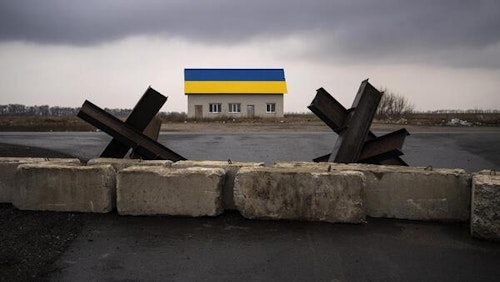
Russia expels more European diplomats
Diplomats from Belgium, the Netherlands and Austria will have to leave Russia, Moscow has announced.
The Russian Foreign Ministry has said this move is in retaliation for similar measures taken by Europe, following Russia's offensive in Ukraine.
An unknown number of Belgian diplomats have been expelled from Russia, after 21 Russian diplomats were asked to leave the country.
A further 15 Dutch diplomats and four Austrians must pack their bags and leave Russia before 24 April.
"We will now see what the consequences are of having so many colleagues leave Moscow and St. Petersburg," said Dutch Foreign Minister Wopke Hoekstra in a statement, adding he "regrets" Moscow's move.
Countries across Europe have pursued a policy of expelling Russian diplomats since Russia invaded Ukraine in February, amid a broader package of sanctions.
Some expulsions have accompanied accusations of espionage.
Germany, France, Italy and Spain have expelled dozens of Russian diplomats in recent weeks.
The Russian Foreign Ministry said it "reserves the right to take retaliatory measures" for "unfriendly and baseless" expulsions of its diplomats.
It promised to respond to each of these measures, with more evictions notices expected in the coming days.
Which country has given the most money to Ukraine?
Lots of nations have donated funds to Ukraine since the war began, but which has given the most?
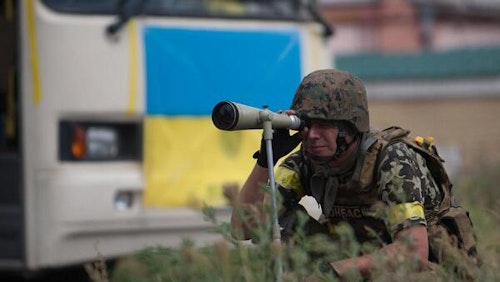
76 freed following prisoner exchange with Russia
Seventy-six Ukrainians have been freed in a prisoner swap with Russia, Kyiv announced Tuesday.
They did not reveal how many Russians had been handed over to Moscow in return or if they had made any other concessions.
"We exchanged 60 soldiers, including 10 officers. Sixteen civilians also returned home," Ukrainian Deputy Prime Minister Iryna Vereshchuk said on Telegram.
This is the fifth exchange of prisoners since the beginning of the Russian invasion she claimed.
A previous prisoner exchange took place on Friday April 15 after "tense" negotiations in the Kherson region in southern Ukraine, according to Kyiv.
Again they did not specify the details of the exchange.
On Monday, Ukraine's security services released footage of the detained pro-Russian politician Viktor Medvedchuk, who asked to be exchanged for an evacuation of the besieged city of Mariupol.
Later that day Russia aired a clip of two British nationals, who were captured fighting for Ukrainian forces.
They appealed to UK PM Boris Johnson to help negotiate their release.
(AFP)
Multiple deaths from shelling in eastern Ukraine
At least five people have been killed and three wounded, following a Russian attack on a residential area in Kharkiv, say AP journalists.
Tuesday's attack took place as residents attempted to carry on with business as usual in the city, with spring flowers being planted in public areas by state employees.
Five other civilians in the northeastern city have been killed and 17 wounded in the past 24 hours, according to the regional governor in Kharkiv.
Kharkiv is near the front lines and has suffered repeated shelling from Russia since the war began.
(AP)
The most powerful pictures taken during the Russia-Ukraine war
Over the last two months, photographers have been putting their lives on the line to capture the realities of the war engulfing Ukraine. Here is a look at 20 of the most powerful photographs taken during the conflict.
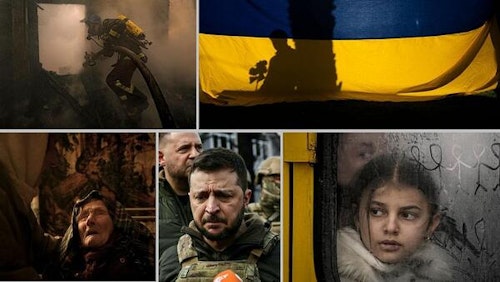
War of attrition next, predicts UK official
The war in Ukraine is likely to move into a phase of "attritional conflict" that could last many months, British officials have said.
A senior UK national security official briefed the country's government Tuesday, as Russia ramped up its offensive in the east of Ukraine.
The official claimed Russia has not learned from previous setbacks in northern Ukraine, saying some units were refusing to fight and that soldiers were committed to fight in a "piecemeal fashion."
Russia's larger number of troops was also "unlikely to be decisive on its own" against fierce Ukrainian resistance, the official said.
Max Blain, spokesman for the UK Prime Minister, said Boris Johnson had told the cabinet Putin's position in Ukraine was "perilous."
The Russian leader is "angered by defeats but determined to claim some sort of victory regardless of the human cost," he added.
Boris Johnson to discuss toughening Russian sanctions with other world leaders
British Prime Minister Boris Johnson will speak to US President Joe Biden and other world leaders later today to discuss toughening sanctions against Russia as well as further support for Ukraine, Johnson's spokesman said, according to Reuters.
Leaders from Canada, France, Germany, Italy, Romania, Japan, NATO and the European Commission are also set to join the call.
First Ukrainian city falls in new offensive in the east
Russian forces have seized the city of Kreminna in eastern Ukraine, with Ukrainian troops withdrawing from the city, the regional governor said on Tuesday, according to Reuters.
Kreminna, which has a population of 18,000 and is about 574 km southeast of the capital Kyiv, appears to be the first city captured in the new Russian offensive in eastern Ukraine.
"Kreminna is under the control of the 'Orcs' (Russians). They have entered the city," Serhiy Gaidai, the governor of the Luhansk region, told a briefing, Reuters reports.
"Our defenders had to withdraw. They have entrenched themselves in new positions and continue to fight the Russian army," he added.
Almost five million Ukrainians have fled since fighting began
Nearly five million Ukrainians have fled the country since Russia's invasion, the United Nations said Tuesday, sounding the alarm at the rapid exodus and voicing concern that the situation may worsen.
UNHCR, the UN refugee agency, said 4,980,589 Ukrainians had left since Russia invaded on February 24.
In addition, nearly 215,000 third-country nationals -- largely students and migrant workers -- have also escaped to neighbouring countries, meaning around 5.2 million people in all have fled Ukraine since the war began.
Officials call it the fastest-growing refugee crisis in Europe since World War II.
"The key is that the borders remain open, people can access safety and when they get to the neighbouring countries they have access to assistance," UNHCR spokeswoman Shabia Mantoo told reporters in Geneva.
Women and children account for 90% of those who have fled, with Ukrainian men aged 18 to 60 eligible for military call-up and unable to leave.
Beyond the refugees, the International Organisation for Migration (IOM) estimates 7.1 million people are displaced within Ukraine.
Nearly two-thirds of all Ukrainian children have been forced from their homes, including those still inside the country.
Before the invasion, Ukraine had a population of 37 million in the regions under government control, excluding Russia-annexed Crimea and the pro-Russian separatist-controlled regions in the east.
(AFP)
Kremlin refuses to comment on Moskva losses
The Kremlin has declined to comment on how many of the Moskva's crew were lost, after the flagship of Russia's Black Sea Fleet sank last week.
In recent days, numerous testimonies have circulated on Russian media and social networks about missing sailors, since the warship was sunk by a suspected Ukranian missile on Thursday.
"All the information is provided by the Ministry of Defense," said Dmitry Peskov, a spokesman for the Russian presidency, on Tuesday. "We do not have the prerogative to communicate."
Dmitry Chkrebrets, who said he was a father of a missing person, posted a message on the Russian social network Vkontakte, asking why his son, a conscript, was in a combat zone.
Another Russian woman, Yulia Tsyvova, also reported to the media that her son was missing.
Russia maintains that the crew of the Moskva were evacuated to safety before the ship sunk, and has not reported any deaths or injuries.
The country's defence ministry released a video on Saturday that purported to show dozens of the surviving crew members on parade in front of the head of the navy. But if this is the ship's actual crew cannot be verified.
The sinking of the Moskva, which played a key role in the coordination of the Russian ships in the Black Sea, was seen as a major blow to the prestige of Russian forces and boosted Ukrainian morale.
Read more about how the loss of the Moskva will affect the Ukraine war: Will the sinking of the Moskva impact the Ukraine war?
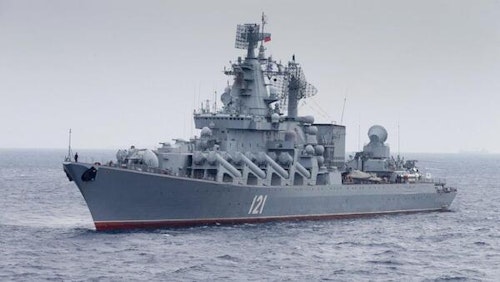
Russian FM: New stage of Ukraine campaign 'starting now'
Russia's Foreign Minister, Sergey Lavrov, has said Moscow's military operation in Ukraine is entering a new stage, as the country ramps up its offensive in the east.
He made the remarks in an interview on Indian television Tuesday, saying "another phase" of Russia's Ukraine campaign was "starting now."
This comes as Ukrainian authorities said on Monday that Russia had launched a major offensive in the country's eastern industrial heartland.
Lavrov said Russia was aiming for the "full liberation of the Donestk and Luhansk republics,” where Moscow-backed separatists have been battling Ukrainian forces since 2014.
Both regions, which have large numbers of Russian speakers, have declared independence from Ukraine, although they are not officially recognised by Ukraine and the west.
Sweden allocates $1bn for welcoming Ukrainian refugees
The Swedish government is set to give $1 billion (€926,650,000) to the country's migration board to help with the cost of receiving Ukrainian refugees.
Tuesday's proposal, which was presented by Sweden’s Finance Minister Mikael Damberg, comes on top of an increase in military spending, following Russia's invasion of Ukraine.
The money for Ukrainian refugees was set aside in Sweden's 2022 budget, and will be taken from development aid.
Sweden's government has repeatedly said it will take a share of the refugees from Ukraine, although not at past levels.
At the height of Europe's migration crisis in 2015, the country took in a record 163,000 migrants and refugees - the highest per capita of any European country.
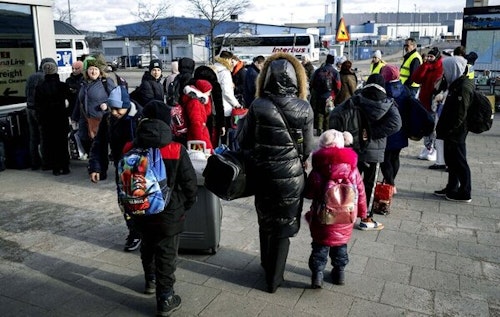
WHO senior official condemns attacks on Ukrainian health workers
The director-general of the World Health Organisation (WHO), Dr Tedros Adhanom Ghebreyesus, has condemned what he called a "continued increase" in attacks on healthcare workers and provisions in Ukraine.
In a statement on Twitter, he said that the WHO had verified 147 such attacks, which had left 73 people killed and 53 injured.
"War will not be a solution. Once again, I call on Russia to end the war," Tedros wrote.
Ukrainian foreign minister on working visit to Bulgaria
Ukraine’s Foreign Minister Dmytro Kuleba is in the Bulgarian capital today to discuss the ongoing conflict in Ukraine.
So far he's met with his Bulgarian counterpart, Teodora Genchovska, to discuss steps to restore peace in Ukraine, as well as strengthening bilateral cooperation and advancing Ukraine’s EU membership.
Kuleba is also set to meet with Prime Minister Kiril Petkov and President Rumen Radev.
So far over 90,000 Ukrainians fleeing the war have entered Bulgaria, according to Bulgarian media reports.
Russian defence ministry claims they carried out dozens of strikes in eastern Ukraine
Russia's defence ministry claimed in a statement on Telegram that they carried out dozens of airstrikes in eastern Ukraine.
The Russian ministry claimed they hit 1,260 military assets and neutralised 13 strongholds of Ukrainian troops. This could not be immediately verified.
The statement followed announcements from Ukrainian officials that Russia had attempted to break through defences along the eastern frontline.
Russia calls again for Ukrainian troops in Mariupol to surrender, with noon deadline
The Russian military has made a new demand to the Ukrainian defenders of Mariupol to lay down their arms.
Col. Gen. Mikhail Mizintsev gave the Ukrainian troops holed up at the giant Azovstal steel mill in Mariupol until midday (0900 GMT) Tuesday to surrender.
He said that those who surrender will “keep their lives.”
Ukrainian troops who have defended the city for seven weeks have ignored such previous offers. The Azovstal plant, which covers the territory of about 11 square kilometres is the last major Ukrainian pocket of resistance in Mariupol, a strategic port on the Sea of Azov.
Earlier Tuesday, Eduard Basurin, a spokesman for the Russia-backed separatists in the Donbas region, said that assault groups had moved into Azovstal in a bid to uproot the Ukrainian troops following bombing and artillery barrage.
(AP)
Greece seizes Russian tanker as part of EU sanctions
Greek authorities say they have seized a Russian tanker in the Aegean Sea as part of European Union sanctions imposed against Russia.
The Greek coast guard said the Russian-flagged Pegas, an oil tanker with 19 Russian crew members on board, was seized April 15 and is currently anchored in the bay of Karystos, on the southern coast of the island of Evia. The coast guard said the seizure order concerned the ship itself, and not its cargo.
The European Union, of which Greece is a member, has adopted a wide range of sanctions against Russia over the latter’s invasion of Ukraine, designed to pressure the Russian economy and the government of President Vladimir Putin.
The sanctions include import and export bans for a wide variety of goods, and a ban on access to EU ports by Russian-flagged ships.
(AP)
French finance minister says it is 'more necessary than ever' to stop European oil imports from Russia
French finance minister Bruno Le Maire said it was "more necessary than ever" to stop European imports of Russian oil after Ukrainian officials announced Russia had begun a new offensive in the east of the country.
“We have always said that we want an embargo on coal, it is done, and an embargo on Russian oil," Le Maire said.
"When you see what is happening in the Donbas...more than ever, it is necessary to stop the imports of oil from Russia," he said.
(AFP)
Powerful explosions reported along Donetsk frontline
On Tuesday morning Ukrainian media reported a series of explosions, some powerful, along the front line in the Donetsk region, with shelling taking place in Marinka, Slavyansk and Kramatorsk, according to Reuters, although the news agency was not immediately able to verify the reports.
Blasts were also heard in Kharkiv in the northeast, Mykolaiv in the south and Zaporizhzhia in the southeast, with air raid sirens going off in main centres near the front line, it said.
Ukraine's top security official, Oleksiy Danilov, said that Russian forces were attempting to break through Ukrainian defences "along almost the entire front line of Donetsk, Luhansk and Kharkiv regions".
Russia focuses on Donetsk, Luhansk regions in eastern Ukraine
The Ukrainian military’s General Staff said Tuesday that Russian forces are focusing their efforts on taking full control over the Donetsk and Luhansk regions in the east.
It noted that a “new phase of war” began Monday when “the occupiers made an attempt to break through our defences along nearly the entire frontline in the Donetsk, Luhansk and Kharkiv regions.”
It said in a statement issued early Tuesday that “the Russian military has continued to blockade and shell Mariupol and to deal missile strikes on other cities.”











